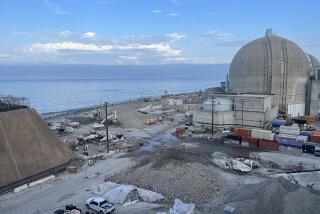U.S. Will Follow Court Order to Receive Private Nuclear Waste
- Share via
WASHINGTON — The Clinton administration will comply with a court order and accept for disposal tons of highly radioactive nuclear waste from civilian reactors. Officials say, however, there’s no place to put it right now.
The Energy Department said Tuesday it would not challenge a July appeals court ruling that directed the department to accept spent nuclear fuel now stored at commercial reactors in 34 states, beginning in 1998.
Assistant Energy Secretary Thomas Grumbly acknowledged that the government can’t say now where it will put the used reactor fuel. He said he hoped that by 1998 a decision would be made on whether a permanent repository in Nevada is suitable for the material.
“Physically we can’t take the waste,” said Grumbly.
Even if the Yucca Mountain site in Nevada is found technically acceptable for underground storage of the estimated 30,000 tons of highly radioactive used fuel now at reactors, that facility is not expected to be completed until at least 2010.
The administration has opposed efforts in Congress to build a temporary storage site in Nevada, arguing such a decision could jeopardize efforts to find a permanent repository for the fuel, which will remain highly radioactive for hundreds of years.
In a statement Tuesday, the Energy Department said it would not appeal the July ruling to the U.S. Supreme Court. “The department is reviewing its options as to what further steps may be taken,” the statement said.
In response to a lawsuit filed by nuclear plant operators and some state regulators, a three-judge panel of the U.S. Circuit Court of Appeals ruled that the government is obligated under a 1982 law to take the spent fuel now at reactor sites and store it at a centralized location beginning at least by Jan. 31, 1998.
If it fails to do so, the government will be in violation of its contractual agreement with the electric utilities, the court said, although it did not propose how the government would accept the fuel if it had no storage site.
“We think the best option is [for the department] to go back to Congress next year with legislation giving DOE authorization for a federal interim storage facility,” said Steven Unglesbee, a spokesman for the Nuclear Energy Institute, an industry trade group.
More to Read
Sign up for Essential California
The most important California stories and recommendations in your inbox every morning.
You may occasionally receive promotional content from the Los Angeles Times.













